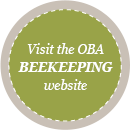Kids' Zone
In this section you will find interesting facts about bees, honey and beekeepers. You'll also find some puzzles that you can print out and solve. Have fun.....
Busy as a BEE
Honeybees are called social insects because different members of the colony have special jobs which help the entire colony. Do you have special jobs or chores that you do to help your family?
There are three kinds of honeybees in a colony. Those are; a queen bee, drones and workers. The drones are male bees that mate with the queen. The worker bees have many tasks in the hive including: cleaning the hive, fanning their wings to cool the hive and feeding the larvae. Worker bees also collect nectar which they make into honey. In addition to collecting nectar the worker bees also help in the pollination of plants.
Dancing bees?!? Honeybees communicate by dancing. The dances tell worker bees where to find nectar.
Honeybees were brought to North America by the Colonists.
See more neat facts about bees
Activities & Puzzles
Puzzles and educational resources that help you learn about beekeeping and the production of honey.
Check out our activities & puzzles
Honey I Love You
Comb honey is honey in the wax honeycomb cells. You can eat both. Beeswax is also used to make candles, lipsticks and floor wax.
Crystallization: All honey will crystallize (develop sugar like granules) in time. Honey will crystallize rapidly if placed in cool temperatures. Place a jar in you fridge and one in the cupboard to see for yourself. If you're worried about getting rid of the crystals don't be, carefully place the jar of crystallized honey into a pan of warm water. The honey will re-liquefy when heated.
Some honey (called creamed or spun) is finely crystallized. This makes the honey easy to spread like butter.
Canadian Agricultural Museum - Ottawa
See how bees produce honey and many other by-products, and explore the role and tools of the beekeeper. Check out the Museum's live hive and try to find the queen among all the workers and drones.
If you can't visit the Taking Care of Beesness exhibition, or to find out even more, check out the Bees: A Honey of an Idea virtual exhibition or check out the Educational Kit



